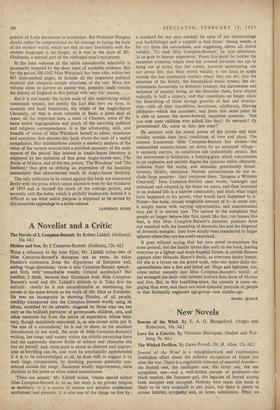A Novelist and a Critic
Mother and Son. By I. Compton-Burnett. (Gollancz, 12s. 6d.) WITH a reference to the later Eliot, Mr. Liddell writes two of Miss Compton-Burnett's dialogues out as verse; he takes Pluedra's confession from the Hippolytus of Euripides and, adding 'stage directions,' turns it into Compton-Burnett speech: and both with 'remarkable results. Critical acrobatics? But justified, I think, because they illuminate both Miss Compton-
Burnett's work and Mr. Liddell's attitude to it. Take first his attitude: clearly he is not uncomfortable at mentioning the novels in the same breath as the work of Mr. Eliot or Euripides.
He sees no incongruity in showing Phaedra, of all people, credibly transported into the Compton-Burnett world, using its idiom, modified by its adverbs. Angered by those who see her
only as the brilliant portrayer of governesses, children, cats, and
other creatures far from the centre of experience, whose terri- tory, though exquisitely examined, is, as one recent critic put it,
'the size of a cat-cushion,' he is out to show, in his excellent introduction to her work, the scale of Miss Compton-Burnett's writing, her range and variety within the strictly unvarying form and the apparently Barrow limits of subject and character she has set herself; and, since scale is about as abstract and unprov- able as 'anything can be, and must be emotionally apprehended if it is to be acknowledged at all, he does well to suggest it by such large comparisons, by invoking passions generally con- sidered outside her range, characters wholly ungovernessy, verse rhythms in the prose so often called monotonous.
'There are people,' Mr. Liddell writes, 'whose special author Miss Compton-Burnett is; to us, her work is no private religion or snobbery—it is a source of intense and peculiar intellectual excitement and pleasure. It is also one of the things we live by:
a standard for our own conduct (in spite of our shortcomings and backslidings) and a support in bad times.' Strong words, a far cry from the cat-cushion, and suggesting, above all, moral validity. 'To read Miss Compton-Burnett,' he says elsewhere, 'is to gain in human experience.' From this point he tackles the recurrent criticism, which even her avowed admirers are apt to bring out at times, that her novels, however entertaining, are not about life; that their moral validity is too local to apply outside the late nineteenth century where they are set; that the structure of the family, the hierarchical social system, the cir- cumstances favourable to domestic tyranny, the narrowness and seclusion of country living, as she describes them, have altered radically in half a century, and that conditions no longer allow the flourishing of those strange growths of fear and domina- tion—with all their murderous, incestuous, adulterous, thieving offshoots—which she examines; and from this same point he is able to answer the lower-browed, impatient question: 'Did you ever meet children who talked like that? Or servants? Or governesses? Or, come to that, just men?'
He answers with the moral power of the novels and their validity outside their local conditions of time and place. The curious framework Miss Compton-Burnett has chosen—the undescribed country-house, set down by an unnamed village— is certainly narrow, its conditions are undoubtedly extinct. But the narrowness is`deliberate, a burning-glass which concentrates to an explosive and terrible degree the passions which obscurity, isolation from the world, and domestic promiscuity breed: tyranny, loyalty, resistance. Narrow circumstances do not ex- clude large passions: they compress them. 'Imagine a Winston Churchill,' Miss Compton-Burnett once wrote, 'untaught and untrained and adapted in the sense we mean, and then immured in an isolated life in a narrow community, and think what might have happened to his power, what would have happened to it.' Power—the basic, almost weighable amount of it—is never lost; it simply varies with varying opportunities, and concentration may put it to sinister uses. The answer to the complaint that people no longer behave like that, speak like that, run homes like that, is that Miss Compton-Burnett's domestic passions have not vanished with the loosening of domestic ties and the dispersal of domestic energies : they have simply been transferred to larger spheres where they are less easily examined.
It goes without saying that her new novel re-examines the same ground; but the family tyrant dies early in the book, leaving everyone to a lighter and more hopeful future. A certain flatness appears after Miranda Hume's death, as everyone draws breath; for she is a tyrant on the grand scale, who can make daily dis- agreeableness into a fine and lethal art. Hope and lightness, too, come rather uneasily into Miss Compton-Burnett's world : at her strongest she deals with intenser horrors than those of Mother and Son. But, in this breathing-space, the comedy is more en- gaging than ever, and there are some splendid portraits of people in that fictionally neglected age-group—late middle-age.
• ISABEL QUIOLY










































 Previous page
Previous page